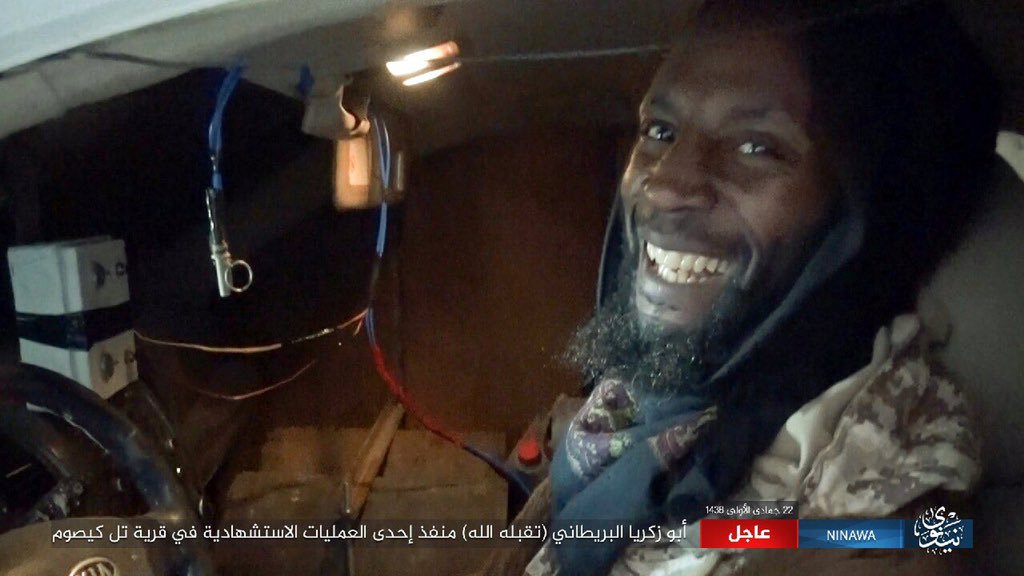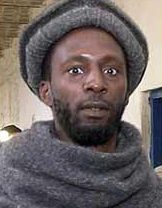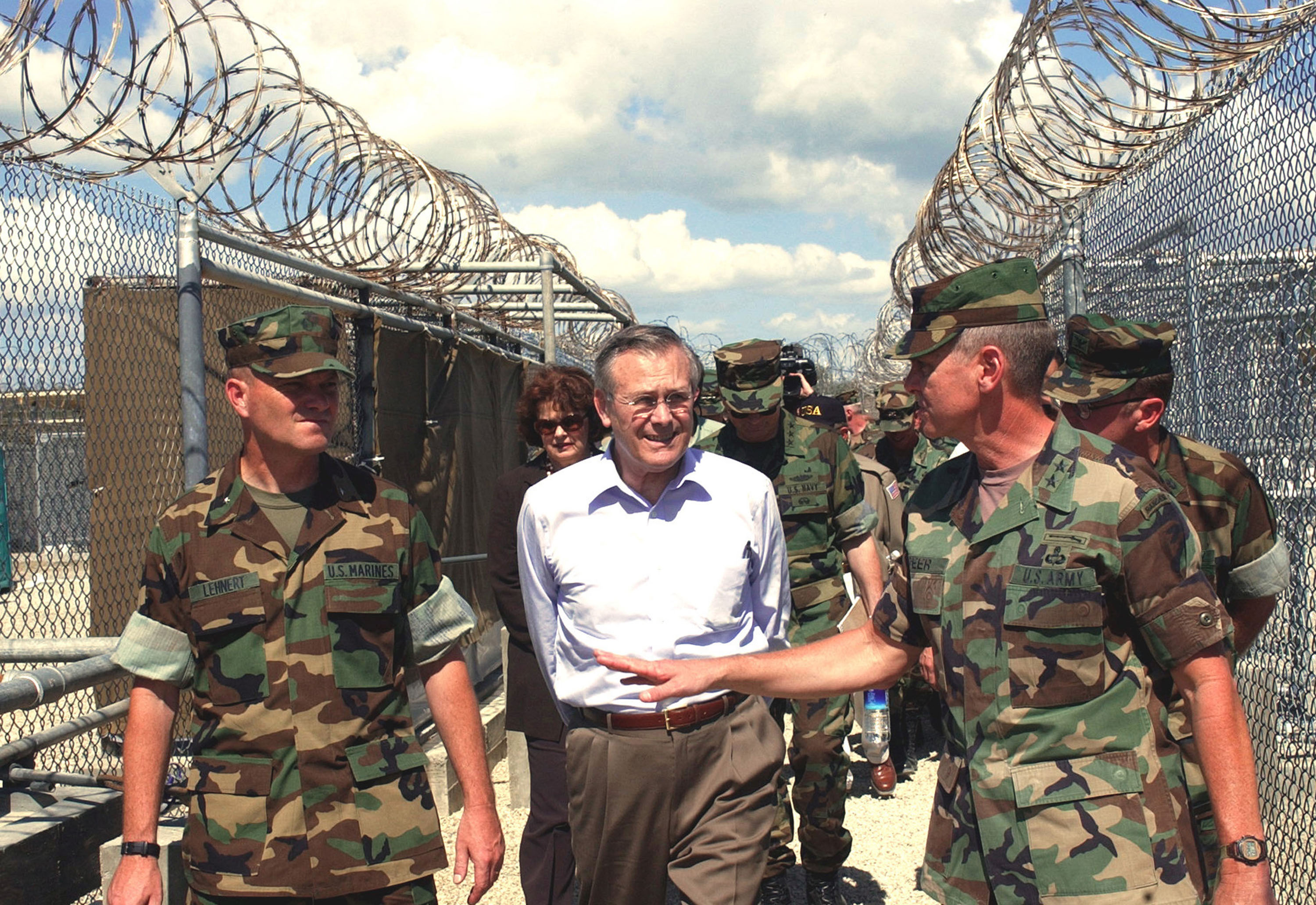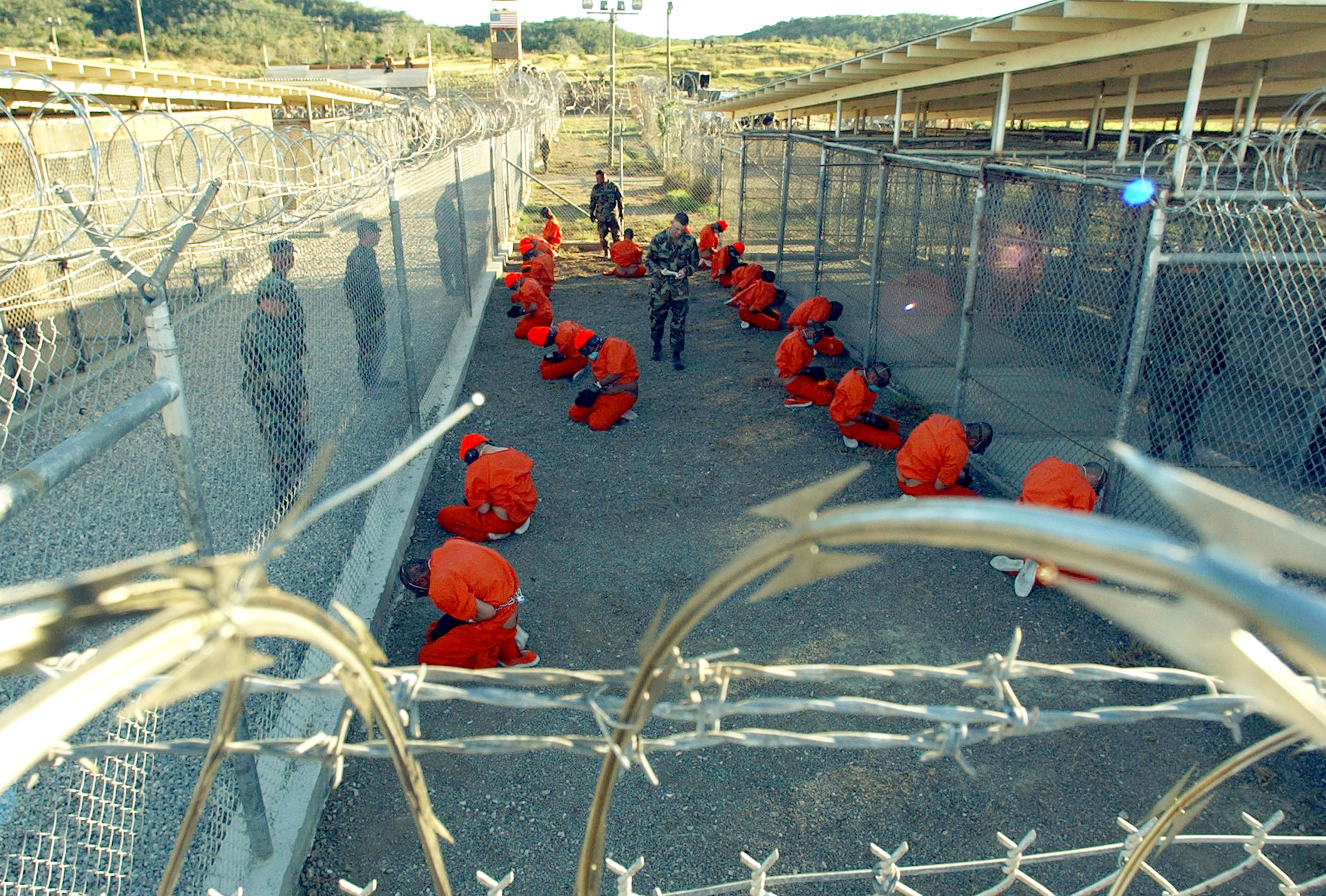
Ronald Fiddler was seen smiling in a video released by ISIS just before he detonated his vehicle in a suicide bombing in Mosul, Iraq.
A British-born ISIS fighter seen smiling in a video taken before he blew up a suicide bomb in an attack on Iraqi forces in Mosul is a former Guantanamo detainee who left his homeland to join the so-called Islamic State two years ago.
Ronald Fiddler, known as Jamal Udeen Al-Harith, detonated a car bomb at an Iraqi army base in Tal Gaysum, the BBC reports.
The 50-year-old attacker was identified in ISIS propaganda materials as Abu-Zakariya al-Britani. The “al-Britani” name is often used by ISIS fighters to indicate their British background, experts say. According to the BBC, the news organization obtained ISIS registration papers signed by Fiddler when he crossed into the Islamic State territory in 2014, volunteering as a fighter.
Fiddler was born in Britain to parents who had immigrated there from Jamaica. He converted to Islam when he was in his 20 and changed his name to Jamal Al-Harith. He received compensation from the British government after he claimed he was tortured and faced other atrocities while in American custody.
Here’s what you need to know:
1. Fiddler & At Least 3 Other ISIS Fighters Detonated Suicide Bombs During the Attack, Killing Several Iraqi Soldiers
Fiddler and at least three other ISIS fighters detonated suicide bombs in Mosul during attacks on the Iraqi army last week that left several soldiers dead and others wounded, according to the Associated Press.
Al-Masdar News, which posted portions of the video showing the attack, said three of the bombers successfully detonated their cars, while a fourth blew up before reaching its target.
Exact details on the number of dead and wounded in the attacks were not immediately available.
2. He Was Found by Americans in a Taliban Jail & Was Held as an Enemy Combatant Because of Suspicions Over Why He Was in Afghanistan

Jamal al Harith.
Fiddler, who was at the time going by the name Jamal Al-harith was detained by American soldiers as an enemy combatant in 2002 after he was found in a Taliban jail in Kandahar, Afghanistan, according to The Guardian.
According to The Age, Fiddler said he was backpacking in Pakistan in early 2002 when he paid a truck driver to take him to Iran. The truck was stopped near the Afghan border by Taliban soldiers who detained Fiddler after spotting his British passport. They held him on suspicion of being a spy.
American forces initially sought to have Fiddler sent back to Britain, but became suspicious of why he was in Afghanistan, according to The Guardian.
He was taken to Guantanamo Bay and held there for two years without charges. He wrote about his time in Guantanamo in a statement before the Committee on Legal Affairs and Human Rights of the Council of Europe Parliamentary Assembly in 2004:
During my imprisonment by the United States Forces, I was deprived of access to my friends and family. I was never allowed any legal advice and never informed of any specific allegations or charges against me. I was repeatedly questioned to try to make me confess to something I had not done. My impression was that my interrogators were not interested in whether they obtained the truth from me but were simply intent on trying to make me confess. I refused to do so as I maintained my belief in myself and my innocence throughout this very difficult period.
I was eventually told that I was to be released and this happened on 9 March 2004. I was never given any reason or explanation for my detention or any apology about any of the things that were done to me. I have been left with intermittent significant pain in my knees which I believe arises from being repeatedly forced onto my knees and pressed downwards by guards during various other processes during my detention. These events happened almost every day. I am also suffering continuing pain in my right elbow. I am also concerned about the long-term psychological effects.
I was imprisoned in Guantanamo for more than two years until my eventual release on 9 March 2004.
The irony is that when I was first told in Afghanistan that I would be in the custody of the Americans, I was relieved at that point as I thought that I would then be properly dealt with and returned home without much delay. I knew that I had done nothing wrong. I have never been in any kind of trouble with the law and have never engaged in any kind of fighting or planning or participating in any kind of violence or terrorist behaviour.
According to Department of Defense documents, Fiddler was detained “because he was expected to have knowledge of Taliban treatment of prisoners and interrogation tactics.”
He was also accused of being “probably involved” in a terrorist attack against the United States. Officials said he traveled to the Middle East extensively from 1992 to 1996, including with Abu Bakr, an al-Qaeda operative, to Sudan in 1992, during the time when Osama Bin Laden’s network was active there. He told interrogators he attended a school in Sudan, but the DOD said that school did not actually exist.
“The only information they could find for foreigners to go to Khartoum, Sudan, was for Islamic studies in which a majority of the time the individuals were recruited for training in sabotage, kidnapping, improvised explosive devices and commando training,” the documents say. “According to British Embassy personnel on the scene at the Surpozza Prison when the five political prisoners were released, Jamal Al-Harith was indicated as being the ‘leader’ of the five prisoners. They further stated that Al-Harith was cocky and evasive stating that he had provided all the he was going to provide the British Embassy personnel. This was after he had sent a request to the British Embassy through the Red Cross to get out of Afghanistan.”
The DOD also said Fiddler told soldiers he had never been to Saudi Arabia, but told other detainees a meal he ate at Guantanamo tasted like one he had in Jedda, Saudi Arabia.
He was deemed to be a “high threat to the U.S.” and was considered an al-Qaeda fighter by the DOD.
3. He Was Released From Guantanamo & Was Paid £1 Million by Britain in Compensation

Then-Secretary of Defense Donald Rumsfield tours Guantanamo. (Getty)
Fiddler was released from Guantanamo Bay in 2004 after campaigning from the British government.
He was among four British men to sue then-Secretary of Defense Donald Rumsfeld. He alleged he suffered “cruel, inhuman and degrading treatment,” including illegal interrogations, torture and religious abuse. They were represented by the Center for Constitutional Rights and private lawyers, according to the center’s website.
The lawsuit was dismissed in 2009 on the grounds of “limited immunity” for government officials, and the U.S. Supreme Court declined to hear the case in 2009.
According to the Daily Mail, he was paid £1 million in compensation by Britain after his release. He successfully argued that British agents knew or were complicit in his alleged mistreatment at Guantanamo.
David Blunkett, who was then the Home Secretary, told the media when Fiddler was released, “No one who is returned… will actually be a threat to the security of the British people.”
Blunkett was among members of the British government who campaigned for Fiddler to be set free from Guantanamo.
4. He Left Britain in 2014 to Join ISIS in Syria, Along With His Wife & 5 Children
He returned to Britain after he was released from Guantanamo without charges.
In 2014, he fled to Turkey and crossed the border into Syria to join ISIS as a fighter, The Independent reports.
According to Channel 4 News, his wife, Shukee Begum, also a native of Britain, and their five children later joined him in Syria. His wife tried to convince Fiddler to return to Britain, but she was unable to convince him. Begum and her children eventually fled from ISIS territory, according to the BBC.
According to Channel 4, the news that Fiddler had fled to join ISIS raised concerns in Britain. The news channel said officials were not sure if restrictions had been placed on his travel, such as taking his passport, after he returned from Guantanamo.
“Whether or not this was known to the authorities we will have to find out, but it is extraordinary that this happened to him after the assurances that had been given both by the British government and others about why he should be released from Guantanamo Bay,” Home Affairs Select Committee member Keith Vaz told Channel 4 in 2015, calling for an investigation by then-Home Secretary Theresa May. “This is something that needs to be pursued.”
The BBC reports about 850 people from Britain have gone to the Middle East to become fighters. Of those, just under half returned to Britain and about 15 percent are believed to be dead, the BBC reports.
“The UK has advised for some time against all travel to Syria, and against all travel to large parts of Iraq,” the British Foreign Office said in a statement. “As all UK consular services are suspended in Syria and greatly limited in Iraq, it is extremely difficult to confirm the whereabouts and status of British nationals in these areas.”
5. He Grew Up in Manchester, Worked as a Web Designer & Had a Relationship With the Daughter of an Australian Politician Before His Guantanamo Detention

Detainees at Guantanamo in 2002. (Getty)
Ronald Fiddler was born in Manchester, England, and worked as a web designer, the BBC reports.
He converted to Islam in his 20s and took the name Jamal Udeen-Harith, according to the BBC. His family told the news organization, “he is a gentle, quiet man who rarely spoke of his faith unless asked, and after four years learning Arabic and teaching English at Khartoum University in Sudan, seemed happy enough to return home, marrying and setting up a computer business with his wife. He was a devoted father to their three children and was devastated when the marriage broke down, moving back to Manchester, where he worked as an administrator in a Muslim school.”
Before he was detained in Afghanistan and Guantanamo, Fiddler developed an online relationship with Samantha Cook, the daughter of Australian politician and former Labor Minister Peter Cook, according to The Age.
“I can confirm that my daughter was previously in a relationship with Jamal Udeen,” Peter Cook, then a senator, told The Age in 2004, shortly after Fiddler was released from Guantanamo. “I understand that my daughter has co-operated fully with the relevant authorities and she is not a person of interest.”
He traveled to Australia in 2000, staying with Samantha Cook in Perth for several months, according to The Age. He then returned to Manchester before traveling to Pakistan.
Then-Australian Attorney General Philip Ruddock told The Age that Fiddler, “wasn’t considered at that time a security risk” when he came to Perth, and after being released from Guantanamo Australian authorities conducted an investigation and found “he is not considered to be a security risk now.”

